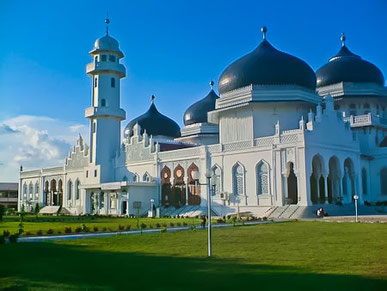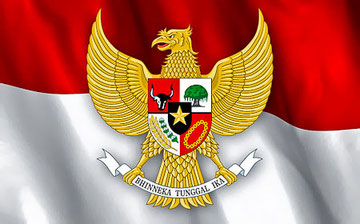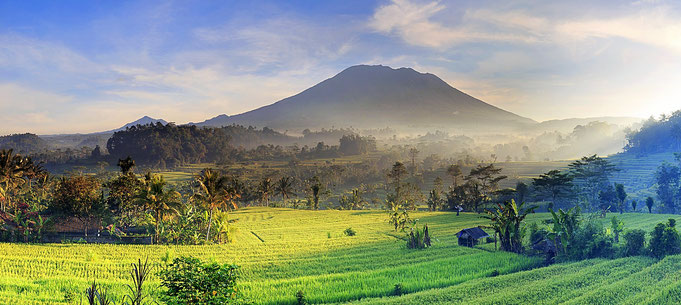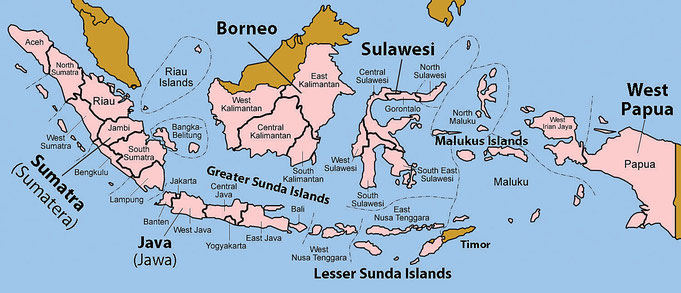
Stretching over more than 5,000 km midway between Southeast Asia and Australia with a total area of 1,978,000 km2, Indonesia is the largest archipelagic country in the world consisting of more than 17,000 islands. The main islands include Java (where the capital Jakarta is), Sumatra, Kalimantan, Sulawesi, Maluccas, Papua, and the Lesser Sunda Islands consisting mainly of West Timor, Flores, Sumba, Sumbawa, Lombok, and Bali. Only about 7,000 islands are populated, while the others are of smaller size, and some even resemble to a large rock.

The total population is 250 million people, the fourth biggest in the world after the United States of America, divided into 500 ethnic groups. More than 450 languages and local dialects are spoken throughout the country. However, since Indonesian independence in 1945, Bahasa Indonesia became the official language. In big towns and tourist places, many Indonesians speak English fairly well. Indonesia is also the first country with the biggest muslim population in the world, nearly 170 millions together with Christian, Hindu and Buddhist minorities. In spite of this, the animism, the ancestral beliefs and practices, is still strongly alive all over the country giving nuance to all these religions.

Indonesia is a democratic republic whose independence was officially proclaimed on August 17, 1945, by Soekarno after more than 300 years of colonialism under the Dutch’s yoke. However, the unification and independence of the country actually occurred in 1949 after the withdrawal of the last Japanese, English and Dutch. Before that, each island carried on more or less independently with its own Sultans and Princes, whose kingdoms were often in conflict from one to another.
After more than 30 years under the domination of autoritarian regime of President Suharto, the Indonesian National Assembly elected and gave the presidency to Abdurrahman Wahid and a vice-president to Megawati Soekarnoputri, daughter of the Indonesia's founding father Soekarno. From this moderate and consensual muslim, the Indonesians people expected economic, political and social reformes that would allow them to get out of the multi-dimensional crisis and take the place they should have occupied in South-East Asia and in the World level. However, corruption cases (the unapproved Japanese Gate in particular) and the inability of Abdurrahman Wahid to resolve the various problemes of the country has brought about his earlier fall.
On Monday 23 July 2001, the extraordinary session of the People's Consultative Assembly (MPR) dismissed President Wahid unanimously from the 590 votes for "violation of the fundamental principles
of the state" and appointed Megawati Soekarnoputri (last word that Means "Soekarno's daughter") as the fifth chief of the Indonesian state. As a head of the Indonesian Democratic Party (PDI)
since 1993, Megawati had become one of the symbols of struggle for democracy in the country. She could claim to unite around her and towards a common policy the different layers of the country -
geographic, ethnic and religious.
On September 20, 2004, more than 150 million people (Indonesia's 250 million inhabitants) took part for the first time in the history of Indonesian politics in the presidential election to vote for their new president by universal suffrage. A new candidate of president came up and won in recent elections: Susilo Bambang Yudhoyono (SBY). Megawati was paying the growing disillusionment of Indonesians over the lack of reforms on corruption and the economy in a country where unemployment and poverty are very high. Susilo Bambang Yudhoyono remained 10 years in power thanks to his re-election in 2009.
On July 22, 2014, Joko Widodo, called Jokowi, was declared the winner of the 2014 presidential elections. For the first time in the history, Indonesia saw a non-establishment-based man come to power. Originally from a modest background, this businessman, who became rich in the sale of furniture, was governor of Solo and Jakarta before gaining the supreme office. As atypical president and reformer, Jokowi increases many hopes of the Indonesian people but the job proves difficult, as corruption remains deep-rooted in the system.



